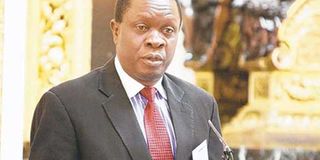Tanzanian government explains lower ranking in ease of doing business report

What you need to know:
According to the DB2019 published by the World Bank on Wednesday, Tanzania’s score fell to 53.63/100 from 54.04/100 attained during the 2018 edition.
Dar es Salaam. Industry, Trade and Investment minister Charles Mwijage said yesterday that Tanzania’s drop in the World Bank Doing Business, 2019 report to 144th position from 137th was a result of various procedural checks instituted to reduce malpractices in the business sector.
Reacting to the DB2019 survey report, Mr Mwijage said he hopes that the measures instituted will facilitate future improvements, adding that ranking was one thing and improving the business environment was another.
DB2019 is the 16th in a series of annual reports investigating regulations that enhance business activity and those that constrain it across the globe. It advocates both regulatory quality and efficiency.
“These rankings don’t give me a headache because we have been dealing with some challenges, and I’m sure the measures we have taken will help to improve the business climate,” Mr Mwijage told The Citizen in an interview.
According to the DB2019 published by the World Bank on Wednesday, Tanzania’s score fell to 53.63/100 from 54.04/100 attained during the 2018 edition.
In the East African region, Tanzania emerged fourth. Rwanda is on top after being ranked 29th globally, followed by Kenya which is ranked 61st, Uganda came third in the region after being ranked 127th globally, while South Sudan and Burundi were at the bottom on 185th and 168th, respectively.
Some of the challenging issues for Tanzania, according to report, were cross-border trade, protecting minority investors and resolving insolvency.
However, Mr Mwijage said to address these challenges, the government would continue to implement plans and policies, which include reducing fees and taxes and reducing delays in business transactions.
He said Tanzania did not perform well on paying taxes due to the fact that many businesses are informal with owners who consider taxes as a nuisance and not obligation.
“We are continuing to change the mindset of our business community because many were used to the ‘business as usual’ way of doing things,” he said.
On delays which have pushed Tanzania down the cross-border trade rankings, Mr Mwijage said these were caused by checks of vehicles to avoid trafficking of arms and people.
He also said the government has improved export and import procedures and infrastructure as well as constructing One Stop Border Posts (OSBPs) to ease procedures and save time.
According to the report, Tanzania performed poorly in cross-border trade, scoring 20.21/100, followed by resolving insolvency at 39.04/100 and protecting minority investors in which it scored 45/100.
Tanzania performed slightly better in starting business, getting electricity, getting credit, enforcing contracts, paying taxes, registering property and construction permits by scoring more than 50 per cent.
Globally, New Zealand emerged on top after scoring 86.59/100 followed by Singapore and Denmark, which scored 85.24/100 and 84.64/100, respectively. Other top-ranked countries were Hong Kong (4th), Republic of Korea (5th), Georgia (6th) and Norway, which was placed seventh.
In Africa, the top ten countries are Mauritius, which was ranked 20th globally, Rwanda, Morocco, Kenya, Tunisia, South Africa, Botswana, Zambia, Seychelles and Djibouti.
At the bottom of the list, there are Somalia, Eritrea, Venezuela, Yemen, Libya, South Sudan, Congo, Central African Republic, DRC, Haiti and Chad.
Issues raised in the DB2019 are similar to those cited in the Blueprint on Regulatory Reforms to Improve the Business Environment, which is the government’s roadmap to improving the business environment in the country.
The blueprint also mentions regulatory inconveniences that are caused by overlapping of functions of various regulatory authorities such as the TBS and TFDA as some of the issues that make doing business in Tanzania difficult.
The blueprint also mentions the duplication of registration requirements of the Social Security Regulatory Authority (SSRA) and Business Registration and Licensing Authority (Brela) on the one hand and Tanzania Employment Services Agency (Taesa) and Brela on the other.
There are also conflicting geographical restrictions regarding work permits and residence permits where the permits may not be valid throughout the country, the blueprint says.




